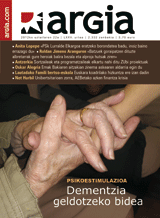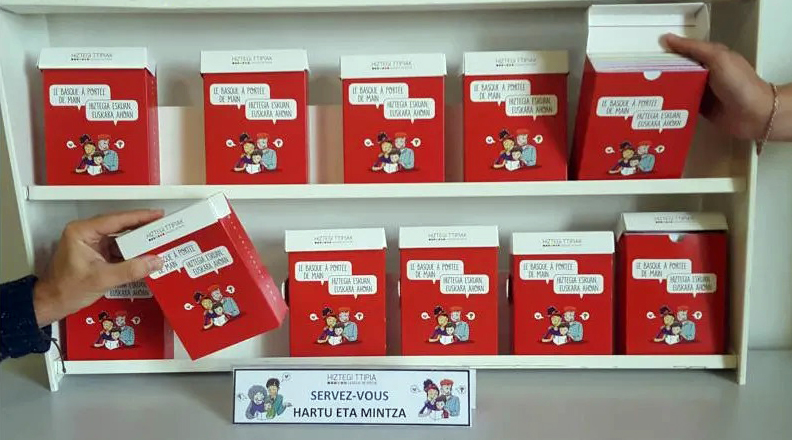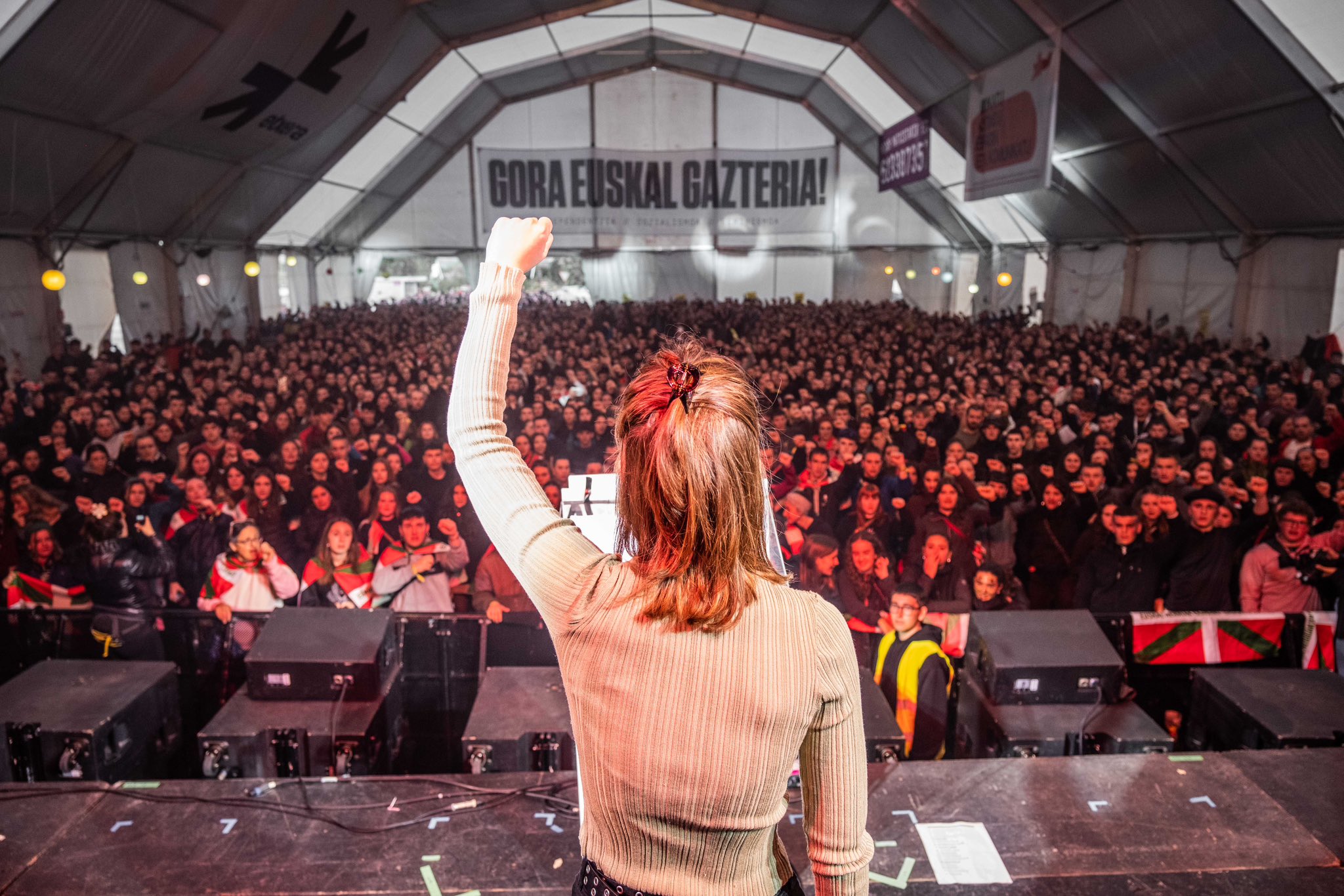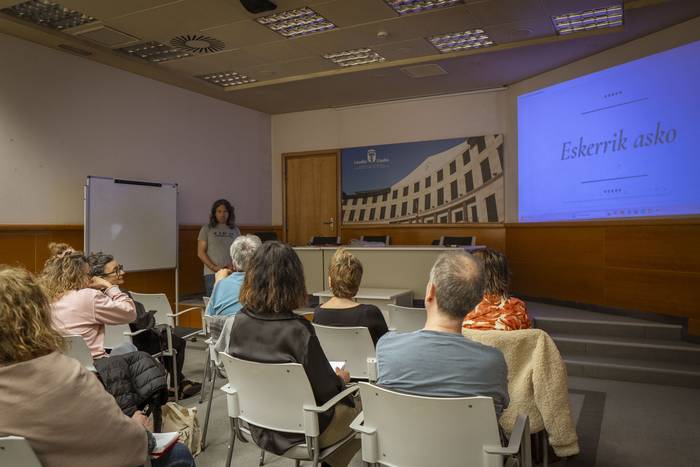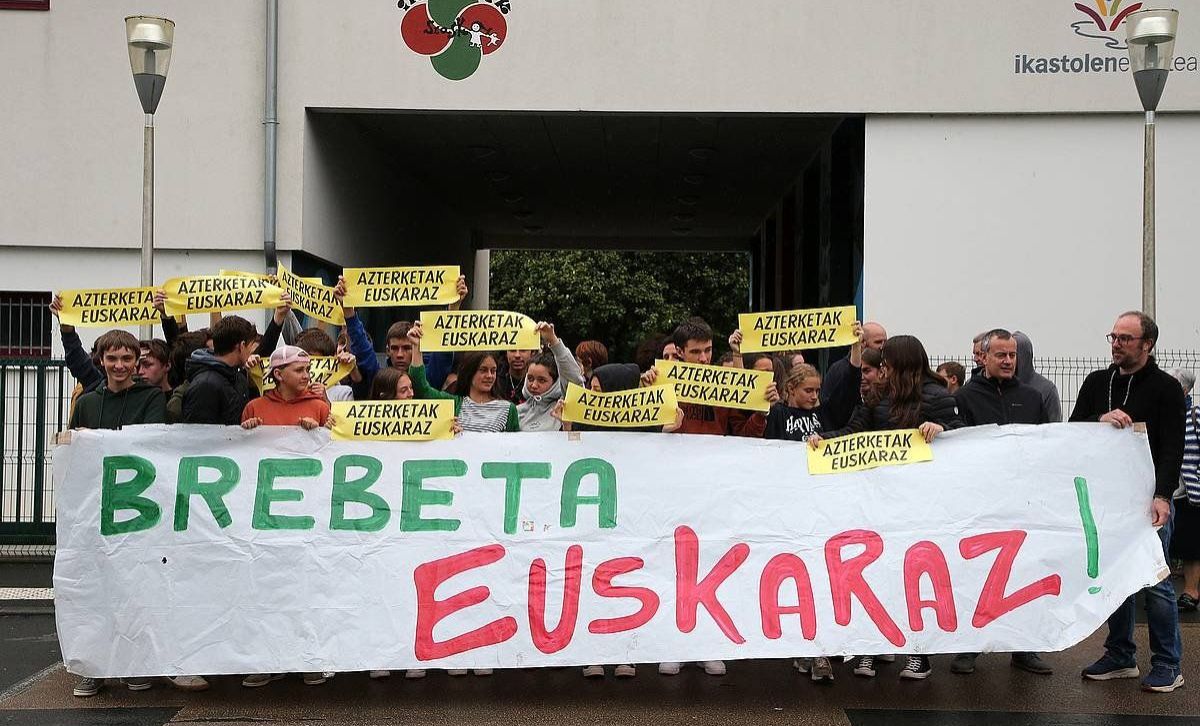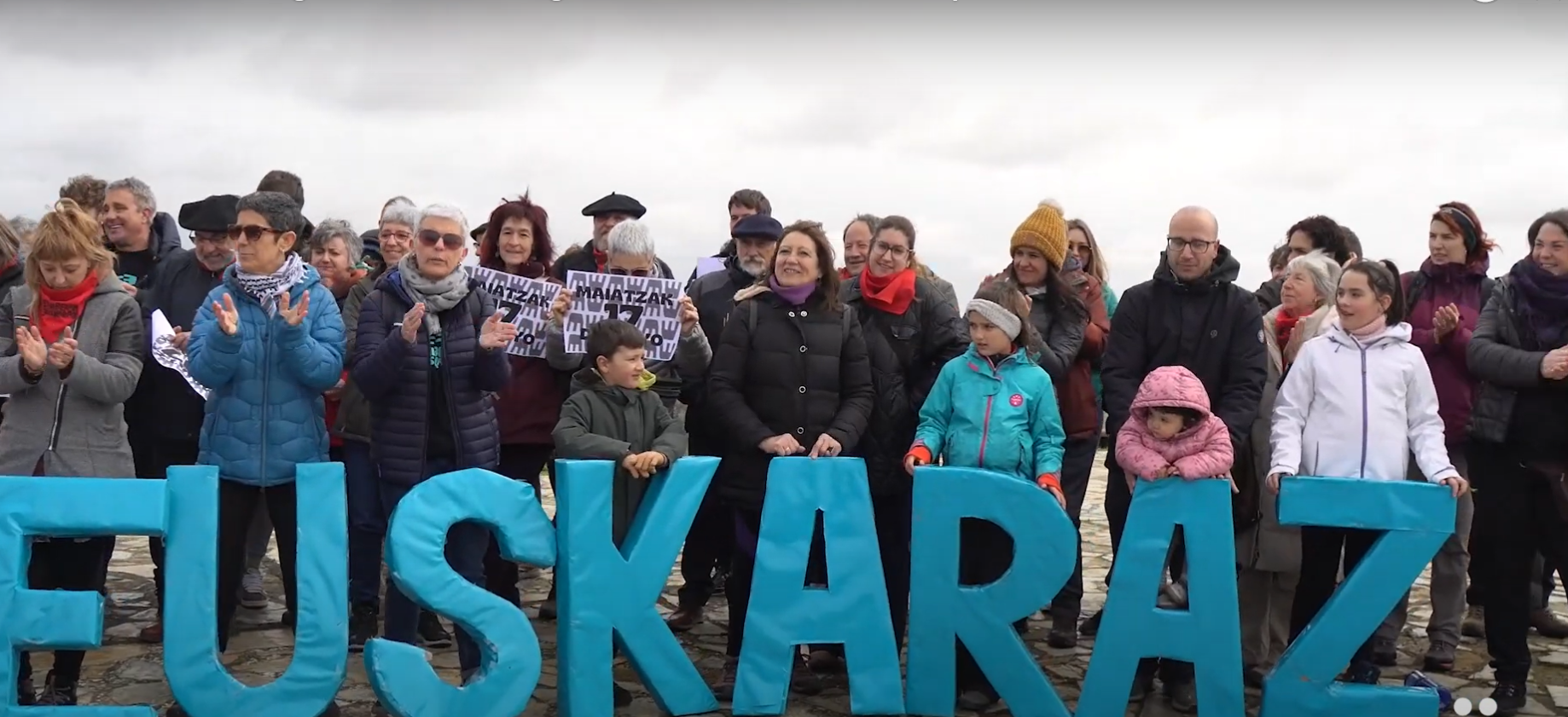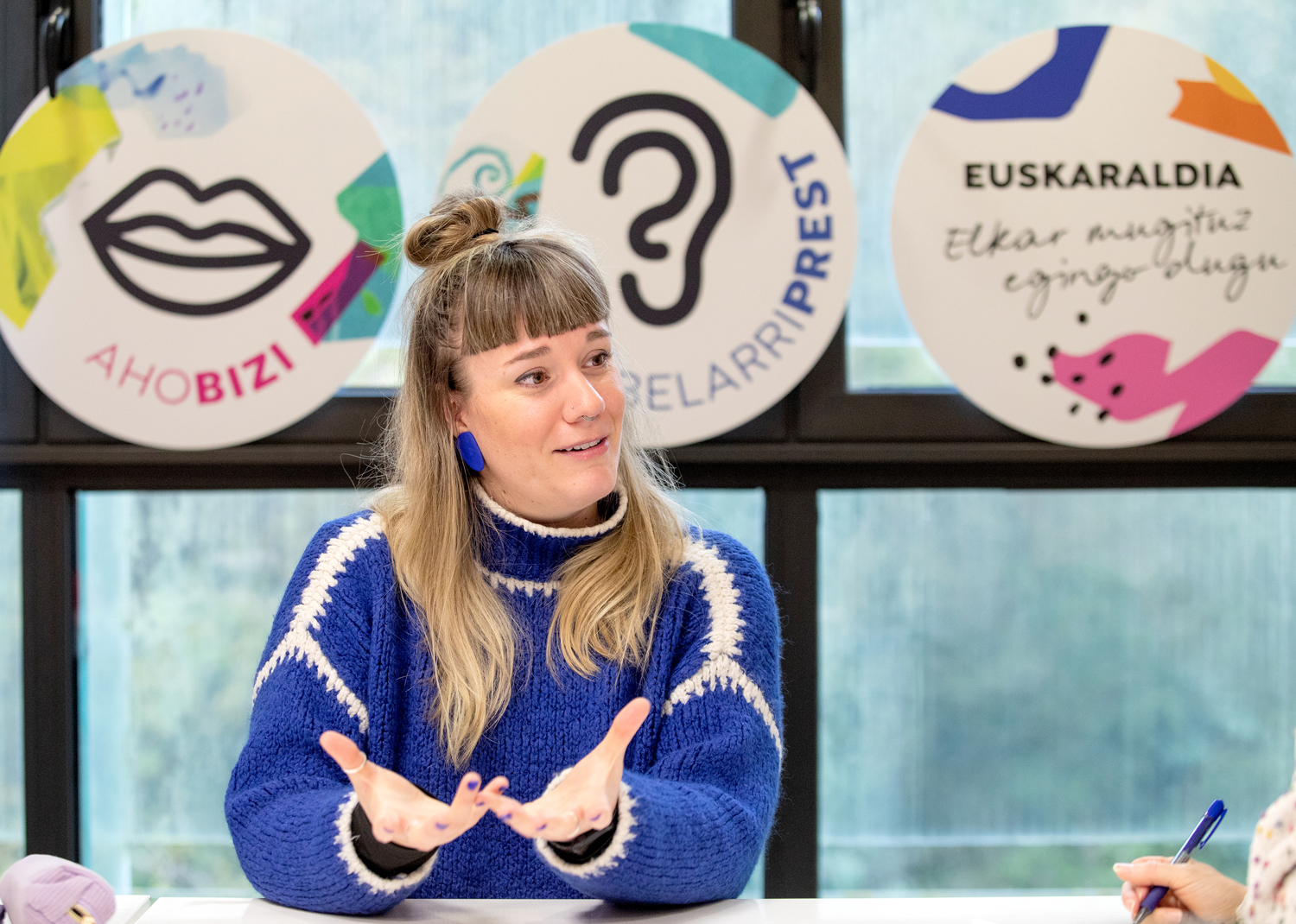Family, bertso and charanga in extraordinary school
- This is a quite unique experience that has been developed over the years in the region of the Alavesa Plains. In order to transmit and use the Basque Country, the fathers and mothers of the public ikastola have Bertsolarism as the axis to achieve their goal. The project brings together parents, young people and children from the town of Biscay.
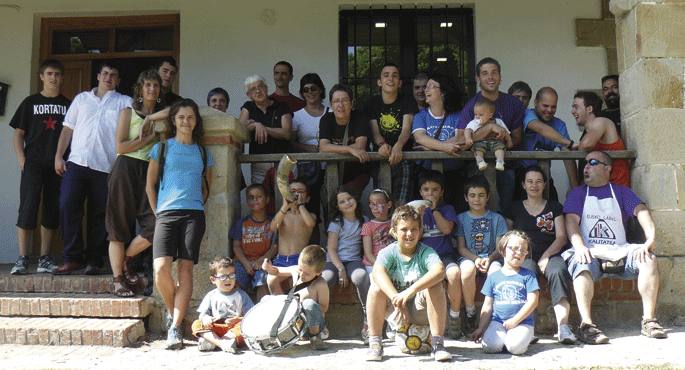
Regarding the current situation of bertsolarism in society, Maialen Lujanbio highlighted the planning and network at Bilbo last June. Ways to create attractive cultural content in the summer. First, the bertsolari champion mentioned the bertso-eskolas: “The idea of the bertso-eskolas is the key to the revolution that we owe to Xabier Amuriza. Bertso-eskola has demystified the figure of bertsolari and told people that he can also sing.”
The Bertso-Eskolas have been around for a long time, they began to walk between 1974-83 in the Valley of Léniz and elsewhere, and still today they are still there, each on their way and around. In this sense, in Álava there is a school that deserves a special mention, because it is an extraordinary school.
The bertsolaris school in the Llanada has two other names next to it, the family and the charanga. La de la Llanada is the family bertso-eskolas charanga. We have been informed by Jon Ruiz de Pinedo and Asier Lafuente. The first is a member and teacher of the Bertsolaris school of young people in Salvatierra and Zalduondo.
The second is that of the Bertsolaris Family School: “The bertso-eskola of Lautada are people of different ages who want to live in Basque. Twenty people from three generations participate, both in the performances and in the bertso-eskola itself, both in the exits of the festivities and in the performances of bertsolaris. In addition, another fifteen people, even if only from time to time, go to school. And, on the other hand, there are fifteen children among them.” They meet every Friday.
Ruiz de Pinedo and Lafuente say that bertso-eskola is also making its way in the normalization of the Basque country: “For example, it has focused on the use of Euskera among school participants, and also among other people outside the group. And the public presence of Euskera on the street has increased. In addition, it has improved the transmission of Euskera and boosted our popular and participatory culture.”
According to both promoters, the work of the school is highly appreciated among the Basques of the Llanada, and also among the Castellanospeakers, as it tends to expand the animation, culture and the good environment. It is not a school to use, although “it has assumed the objectives of a bertso-eskola. At first, the parents started with the children and, at the other, the young ones. In 2010 the two roads came together, met, had good experiences and since then continue together.”
This family charanga has been created in the Basque area of the Llanada. There are, for example, the ikastola Lope de Larrea de Salvatierra who has been working in Basque for many years, the Baietz Association and the AEK of the region. The associations of the Basque Country Satola de Barrundia, Olbea de Salvatierra and Araiako Atsun Euskara Elkartea are also present, working continuously with the efforts of the Basque technician in the region. The Bai Euskarari project also had a technician in the region. “Among them, they have strengthened the Basque base in the Alavesa Plain. The movements that are happening cannot be understood without their work.”
First stone
In May 2006, the first stone of this bertso-eskola was laid in which several Basque fathers and mothers from the Ikastola Lope de Larrea de Salvatierra wanted to live in Euskera and their sons and daughters lived in Euskera. “They were new parents at the ikastola, they had young children, up to 4 years old, and they wanted to transmit the Basque language to them. Even though the transmission was secured at home, the parents talked in Basque with their children at home and, outside of that, they had difficulties, they felt that their children needed closer references so that from a young age they could realize that the Basque is not a father, mother and miss”.
These parents lived the need to meet, to work in a conscious group. “The children had to see that their father and mother met with other parents and spoke in Basque. They considered it very important to give references to their children and needed close references. They knew that, grouped into the group, boys and girls were more easily able to speak in Basque. As children of Basque parents, they had to work the habit of speaking in Basque among the children”. In fact, with colleagues and colleagues, outside the classroom, Castilian is imposed, Euskera is excluded, as here and there.
Thus, they started, creating affective relationships between parents and children, performing pleasant, fun activities, with the objective of living in Basque. But they didn't want to form a closed, self-centered group. Instead, the intention was to take her to the plaza, publicly expose her. At this event, the ikastola Lope de Larrea showed its support to the students of the ikastola. In the course 2006-2007, the pupils of the third cycle of Primary of the ikastola worked on bertsolarism in the school, and for the 12-year-old boys and girls a bertso-eskola was launched in Salvatierra. The parents, for their part, held a giant construction workshop with the children.
Since then, one's children's and parents' workshop has progressed year after year, and in the same way bertso-eskola has been developed. Three years ago, for example, they formed the charanga Jotafa and the bertsos school at Zalduondo. Last year the current Charanga Family-bertso-eskol-txaranga has been rounded up. “In the bertso-eskola of adults we have had five people; in the bertso-eskola of the young we have had eight; the children, ten or fifteen, and finally, in the charanga, fifteen or twenty people. We have created the entire ecosystem and it feeds on itself in Basque.”
With parents at bertsolaris school, young people become child monitors. For children between three and ten years of age, it is important that young people live in Euskera. “Soon parents will no longer be referents, and for these children it is very important to have these close references… The three generations, in addition, have developed a feeling of group. We would highlight the character of young people: they are very open, always prepared, cheerful, courageous, warm… You could not say it by word”. And they have also had other tools such as the bertso-eskola blog www.blogak.com/laube/famili-bertso-eskola-agurainen, the t-shirts they have made, the anthem of the Llanada, the physical meeting point, etc… “The members of the bertso-eskola are known in the Llanada and known for the use of the Basque.”
And what else? Where does the future come from? Ruiz de Pinedo and Lafuente tell us: “First, we have to take care of what is now. What we have experienced may be unrepeatable, because the situation changes, but we will encourage the group’s estimation, in the activities to be developed and in the projects to be developed.”
Bertso-eskolak abian jarri zirenetik 30 urte baino gehiago ere bai, eta eskola haietan bertsotan trebatu zirenetan asko baino gehiago guraso adinean dira egun. Horietarik da Oihane Perea (Gasteiz, 1977) Arabako bertsolari txapelduna 2007 eta 2009an. Gurasoak euskaldun berriak, etxean jaso du euskara, etxean ari da orain bera euskara transmititzen, eta hizkuntzarekin batera, bertsoa, helduen eta gazteen bertso irakasle da Lautadako bertso-eskolan.
Bertsolaria, ama, bertso-eskolan irakasle, haurra hor…
Egia da gurasoak euskaldun berriak ditudala, bertsolaria eta ama naizela... baina bertsotan entrenatu behar eta ez naiz, horretarako, haurrekin geratzen... Bertsotara noalarik, nahiago izaten dut haurrak etxean utzi, izan ere, bertsoa da nire arnasgune preziatuena, baina, egia da, hala berean, nire semearekin batera Lautadako bertso-eskolako partaide naizela.
Zertan zara Lautadako Famili bertso-eskolan?
Irakasle eta ama naiz Aguraingo bertso-eskola horretan. Famili bidezko euskararen eta bertsozaletasunaren transmisioa bultzatu nahiak elkartu gintuen guraso batzuk duela urte batzuk. Haiek bertsoaren misterioak argitu nahi zituzten, euskara ere landu nahi zuten, eta hori guztia seme-alabekin batera egin nahi zuten. Niretzat ere primerako aukera zen ama naizen aldetik, gure semeak etxetik eta kaletik edan zezan euskara eta bertsoarekiko maitasuna, beste gauza askoren artean. Sei urte ditu semeak, eta horretan naiz.
Irakasle zaitugu bertso-eskolan.
Bai, eta nire ikasle edo taldekideak ere gurasoak dira, eta haurrekin joaten dira bertso-eskolara. Zortzi aita eta ama dira, gehienak euskaldun berriak. Hamalauren bat haur ekartzen ditugu guztion artean eta bi taldetan batzen ditugu. Bertso-eskolako 18-20 urteko gazteek dinamizatzen dituzte taldeok: 7 urte bitarteko haurren taldea eta 7 urtetik 11 urte artekoa.
Harrigarria zaigu Famili-bertso-eskola-Txaranga delako hau. Harrigarri, ezohikoa, bederen…
Tira, halaxe da. Baina eskerrak horri eta eskerrak gure herrietan dagoen irudimen eta aniztasunari. Gauza harrigarri eta ezohiko gehiago behar direla esango nuke. Beraz, animatu!
Antton Kurutxarri, Euskararen Erakunde Publikoko presidente ordearen hitzetan, Jean Marc Huart Bordeleko Akademiako errektore berriak euskararen gaia "ondo menderatzen du"
You may not know who Donald Berwick is, or why I mention him in the title of the article. The same is true, it is evident, for most of those who are participating in the current Health Pact. They don’t know what Berwick’s Triple Objective is, much less the Quadruple... [+]
Is it important to use a language correctly? To what extent is it so necessary to master grammar or to have a broad vocabulary? I’ve always heard the importance of language, but after thinking about it, I came to a conclusion. Thinking often involves this; reaching some... [+]
Adolescents and young people, throughout their academic career, will receive guidance on everything and the profession for studies that will help them more than once. They should be offered guidance, as they are often full of doubts whenever they need to make important... [+]
Maiatzaren 17an Erriberako lehenengo Euskararen Eguna eginen da Arguedasen, sortu berri den eta eskualdeko hamaika elkarte eta eragile biltzen dituen Erriberan Euskaraz sareak antolatuta
Ansorena´tar Joseba Eneko.
Edonori orto zer den galdetuz gero, goizaldea erantzungo, D´Artagnanen mosketero laguna edo ipurtzuloa, agian. Baina orto- aurrizkiak zuzen adierazten du eta maiz erabiltzen dugu: ortodoxia, ortopedia, ortodontzia... Orduan (datorrena... [+]
We have had to endure another attack on our language by the Department of Education of the Government of Navarre; we have been forced to make an anti-Basque change in the PAI program. In recent years, by law, new Model D schools have had to introduce the PAI program and have had... [+]
"Ask for your turn and we'll join you," the willing and cheerful announcer who speaks from the studios tells the young correspondent who walks through the streets of Bilbao. The presenter immediately addressed the audience. "In the meantime, we are going to Pamplona..." They opened... [+]









